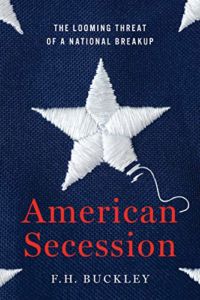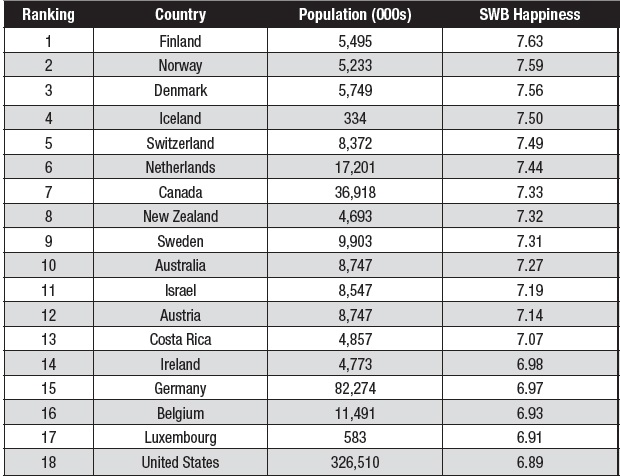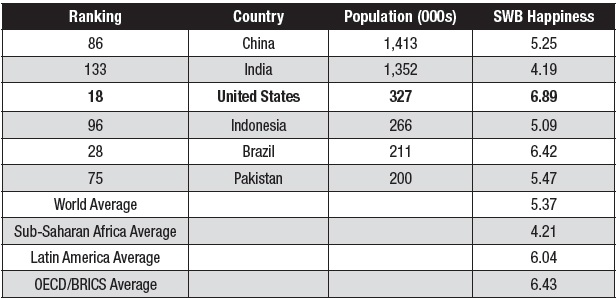Civic Nationalism’s Last Gasp: F. H. Buckley’s American Secession
Posted By Spencer J. Quinn On In North American New Right | Comments DisabledF. H. Buckley just doesn’t get it. He has good instincts and intentions. He’s sniffing around in all the right places. He uses his training in statistics and social science to good effect. (And he’s warm, I’ll give him that.) With all his effort, he could probably discern the exact dimensions of the 500-pound-gorilla-shaped space that’s somehow being occupied in the middle of the room.
But to actually call it a 500-pound gorilla? Never.
In 2020 Buckley wrote a book entitled American Secession: The Looming Threat of a National Breakup. In it he expounds upon the reasons why secession is stirring like a bitch’s brew in the melting pot of modern-day America [2] — and why good, proper-thinking Americans should be concerned about it. Fortunately, he offers possible solutions based on the recent history of his home country of Canada, and expresses hope that the United States will remain indivisible, as it says in the Pledge of Allegiance.
While he’s spot on that the levels of contempt in the chasm between political factions in today’s America has not been seen since the Civil War, his approach is so clinical and timid that he cites the natural shortcomings of a free and prosperous society as the reasons for this contempt. He’s uninterested in the deeper reasons for secession (even to refute them), and prefers instead to stick to the topics he’s allowed to talk about — namely, economics, history, and government — and all from a scrupulously right-of-center libertarian perspective. He completely ignores racial realities and the Left’s genocidal intentions. This makes American Secession, as it was intended by the author, little more than a bland defense of civic nationalism.
What is interesting about the book, however, is Buckley’s lack of confidence in civic nationalism. For him, secession really is looming, with good odds of it happening in the near future, and civic nationalism is breathing its last gasp. He presents his unionist strategies as Hail Mary passes than as shoe-in solutions. Despite his being a speechwriter for candidate Trump in 2016, there is little that is triumphalist about American Secession. So while Buckley remains blind to the race-realism gorilla in the room, he deserves props for at least having a sense of urgency about the problem, and thus dissidents should at least hear what he has to say. With his erudition and clear writing style, the blind sow does have a knack for coming up with the occasional acorn.
Included among these acorns is a nice survey of secessionist movements across the globe, past and present; Buckley’s convincing rehabilitation of President James Buchanan; a fascinating treatise on the political philosophies of David Hume, Charles-Louis Montesquieu, and Jean-Jacques Rousseau (which covers Hume’s nasty spat [3] with Rousseau); solid exposition on the US Constitution and its history (including the struggle between James Madison and Roger Sherman over the size of the fledgling republic’s government); and some good research on the Founding Father’s opinions regarding secession.
Buckley also introduces his readership to Don Livingston of the Abbeville Institute. Livingston is the tall, well-spoken Southern scholar who tirelessly defends [4] the antebellum South on the Internet, and who is also a partisan and secessionist. Buckley, thankfully, takes him seriously and treats him with the respect he deserves. If a reader is interested in any of this, American Secession is certainly worth a look.
What is best is Buckley’s clear understanding that the lunacy of the Left is doing more to encourage secession than anything else:
We thought it couldn’t get any crazier, but the political divide and the breakdown in trust became even deeper after [Brett] Kavanaugh’s confirmation hearings. When Anita Hill accused Clarence Thomas of sexual harassment in 1992, we were permitted to disagree about who was telling the truth. No longer. On the left, fury has been weaponized and moral outrage has supplanted political debate. Hillary Clinton told her supporters, “You cannot be civil,” while Eric Holder, the former attorney general, chided Michelle Obama’s niceness: “Michelle always says, ‘when they go low, we go high.’ No. No. When they go low, we kick them.” We’ve hit rock bottom, with no clear path up.
So far, so good. But instead of examining the source of the Left’s fury, Buckley outlines all his purported reasons for secession that the Left doesn’t care about, as if they are somehow related.
All of these reasons relate to the fact that America is too big. People are naturally happier in smaller countries, according to Montesquieu and the 2018 United Nations World Happiness Report. Therefore, most folks will eventually uproot their families, stuff their belongings into a U-Haul, and ride off into the unknown (to say nothing of risking a second civil war) over statistics and the political arguments of long-dead philosophers. (Hume disagreed with Montesquieu, by the way.)
Here is Buckley’s happiness data:
TABLE 5.1 SUBJECTIVE WELL-BEING RANKINGS: HAPPIEST COUNTRIES
Buckley then scratches his head over why the Finns are “so darned happy.” It can’t be the weather. It can’t be living so close to Russia. Maybe it’s all that cross-country skiing, or their national sport of pesäpallo, or their cuisine, which he informs us “is heavy on buttermilk, lingonberries, and turnips.” Buckley does offhandedly mention that a larger population in Finland would be more diverse and less unified, and therefore less happy. But he doesn’t expound on this, preferring to stick with his less-is-more viewpoint. He doesn’t spot on this chart what anyone on the Dissident Right would discern in an instant: that the top ten happiest countries just might be the happiest due to their high proportion of whites and low proportion of blacks.
I’m quoting Buckley at length here because his tone-deafness is truly astonishing:
If we’re going to make sense of the happiness data, then, we’ll need to take account of much more than population size. Geographic size counts too, which we’ll pick up by looking at population density (number of people divided by square mile). We’ll also want to take regional differences into account. Many of the least happy countries are in sub-Saharan Africa, so we’ll separate that region out. Similarly, Latin American countries have tended to be politically unstable and often have ruinous economic policies, so we’ll break out that region too. The happiest countries are the most economically advanced — the countries of the Organization for Economic Cooperation and Development (OECD) and the BRICS countries (Brazil, Russia, India, China and South Africa) — so we’ll want to consider them separately.
Ethnolinguistic differences can be a source of tension and even conflict in a country, and so we’ll make this a variable. A high level of economic inequality can also be a cause of conflict and of unhappiness. Finally, countries suffering under armed conflict — like Syria, Iraq and Afghanistan — are naturally going to have a lot of unhappy people in them, so we have to take account of such conflicts in the period we’re examining.
Here is his next chart:
TABLE 5.2 SUBJECTIVE WELL-BEING RANKINGS (OVER 200 MILLION PEOPLE)
Note how the happiest large nation in the world by a good margin, the United States, is the only large nation in the world with a white majority. Charts like this one and the one previous scream race realism, but F. H. Buckley, milquetoast that he is, refuses to see it.
Another reason for secession in Buckley’s mind is corruption. Buckley argues not so much that corruption factors into public attitudes on secession, but that corruption is proportional to a nation’s size. In this way Buckley stays in his wheelhouse, and like much of American Secession it is interesting and persuasive — merely beside the point for people who are serious about secession. Yes, special interest groups and their lobbying firms practice legalized bribery when financing campaigns. Yes, “minoritarian misbehavior” is a form of tyranny when influential and cohesive minorities conspire to control elected politicians. Yes, “parasitical Wall Street speculators” are at odds with honest “wealth creators on Main Street.” And yes, legalized corruption, such as various pay-for-play schemes, remains a big problem. All this is no doubt an argument for keeping nations and governments as small as possible. But to say people would be willing to secede over this kind of corruption, as Buckley does, is much more of a stretch.
 [7]
[7]You can buy Greg Johnson’s The Year America Died here. [8]
I’m sure the United States government in 1960 was plenty corrupt, but were race-realist white identitarians, like those in the John Birch Society, actually calling for secession over it back then? Wouldn’t it simply be easier to vote out the swamp rats than to go to war over them? Look at the difference 20 years made in the mind of proto-dissident Wilmot Robertson. He decried non-white immigration in 1973’s The Dispossessed Majority, but still held out hope that “Pax Americana” could occur after an attitude adjustment among whites. In 1993’s The Ethnostate, however, Robertson called for what is effectively secession after accepting the fact that non-white immigration was here to stay.
Buckley is not this perspicacious. He believes secession could be coming, but the reasons he ascribes to it have always been with us. Why is the threat so palpable now, but was less so in 1973, when the United States was still one of the most populous nations in the world?
The answer, at least in America, is race. In a multiracial society, racial groups compete aggressively with each other over the important things: money, power, influence, and space. Gaining advantage in such struggles is more important than truth, honesty, or fairness, and the results will necessarily highlight the average differences between the races. This is a perfectly natural, if regrettable, state of affairs since these differences can generate a good deal of resentment. At present, a coalition of minority races — and religions, as in the case of Islam — have all but criminalized overt white competition in these struggles in order to weaken whites and strengthen non-whites. They claim that for whites to actively compete as a bloc the way non-whites do would be racist, and would highlight the so-called “white supremacy” of the historic American nation.
Sadly, F. H. Buckley is under such a thrall; he cringes over historic white supremacy, yet doesn’t bat an eye over present non-white supremacy. Such a double standard is normal to him. Observe [emphasis mine]:
During most of its history, America’s admirably liberal set of constitutional rights coexisted with the harshest restrictions on people of the wrong color. Before the Thirteenth Amendment they were slaves, and for a hundred years thereafter they labored under the most severe legal disabilities that a country could inflict upon its citizens. Over that period, America was less than fully free.
“The most severe legal disabilities” huh? Well, that’s a lie — the lie that racial minorities (blacks and Jews, mostly) want white people to believe so they can be more easily bullied in the public square. And how do I know this is a lie? From F. H. Buckley himself, whose next sentence reads:
But it was far freer than the USSR, notwithstanding all the freedoms of speech and the press guaranteed under the Soviet Constitution.
Ah, so the “most severe legal disabilities” are not the most severe, after all. American slavery didn’t place the “harshest restrictions” on people. It was far worse to be an emaciated zek above the Arctic Circle in 1953 than a well-fed Alabama field slave a hundred years earlier.
Buckley’s only explanation for imminent secession besides his anodyne less-is-more theory is bad behavior on the Left:
Sixty-three million people voted for Donald Trump in 2016, nearly half of all voters. For much of the media and the academy, they are the enemy. Those who supported Brett Kavanaugh’s nomination to the Supreme Court were “complicit in evil,” according to Senator Cory Booker (D-NJ). You are either contributing to a wrong or you are fighting against it, he said. Trump is destroying democracy, and his voters need to be held accountable, echoed the Washington Monthly. Hillary was right, said Jennifer Rubin. They really are deplorable, in the end. “Those who after all of that still back him either share his racist beliefs or have an incredibly high tolerance for racism.” After the mass murder in El Paso in August 2019, the vitriol was turned up a notch. Not merely is Trump a white nationalist, but so are all his supporters and we’re not about to forgive and forget them. When that’s how people feel, they’re past talking to each other.
While Buckley makes some good points about the Left’s intolerance and tyranny, he doesn’t seem interested in exploring any of the truth behind it. The reason why many on the Left favored secession during the Trump years was because most of them are either non-white (and inherently anti-white), or are white and brainwashed to be anti-white. Donald Trump’s election, with his anti-immigration and populist platform, was a fairly moderate assertion of white racial interests. The Left — which believes that self-assertive whites are effectively Nazis — found this intolerable, and did everything it could demonize Trump and get him out of the White House.
Further, the reason why many on the Right today wish for secession is because, after 2020’s stolen election, the anti-white Left is now in charge. They censor, they oppress, they incarcerate, they attack. Why live with elites who do this to their own countrymen?
Buckley seems to think that if the Left can simply dial back the hate, we can apply his solution to the America-is-too-big problem and prevent secession from happening. That solution is home rule. Home rule, as found in Quebec, will allow different regions of the United States to be able to choose which aspects of federal control they can nullify. Thus, we will see vastly different ways of life in different parts of the country: gun rights and traditional marriage here, abortion rights and gay marriage there. Robert E. Lee and Stonewall Jackson statues here, Martin Luther King and Malcolm X statues there. You see the point. Further, with access to U-Hauls (a common theme in American Secession), people will eventually sort themselves out, and a more variegated and sectionalized nation will find peace in the long run. Vive le différence!
It’s a nice idea, but it is predicated on the Left listening to reason and learning how to behave. Is that ever going to happen? Has the Left ever done this? Probably not, but don’t tell F. H. Buckley that; it might crush what little optimism he has left:
[i]t would be foolish to dismiss the possibility of disunion. It’s the direction in which we’re headed, and the notion that it couldn’t happen again is fanciful. That’s why we need to ask what might be done to restore the bonds of affection that have been so frayed. Home rule is one answer, but more generally what is needed is moderation from both sides, left and right but especially the left, in their desire to enforce their ideas about the good upon the rest of us. For starters we need a greater tolerance for differences of opinion.
These sentences appear at the end of Buckley’s book, and it strikes me as pathetic that he would conclude his treatise on secession with a crescendo of platitudes. So, we need to be more tolerant, huh? That’s his big idea? If Buckley thinks that he can persuade the Left to be more tolerant, then he doesn’t understand why Leftists are so intolerant to begin with. It’s because the Left is possessed by non-white tribalism, which has values that are inherently and biologically opposed to white European values.
This cannot change except by the ultimate submission of whites, or by the very secession that F. H. Buckley sees coming, but cannot fully explain.
* * *
Counter-Currents has extended special privileges to those who donate $120 or more per year.
- First, donor comments will appear immediately instead of waiting in a moderation queue. (People who abuse this privilege will lose it.)
- Second, donors will have immediate access to all Counter-Currents posts. Non-donors will find that one post a day, five posts a week will be behind a “paywall” and will be available to the general public after 30 days.
To get full access to all content behind the paywall, sign up here:
Paywall Gift Subscriptions
 [9]If you are already behind the paywall and want to share the benefits, Counter-Currents also offers paywall gift subscriptions. We need just five things from you:
[9]If you are already behind the paywall and want to share the benefits, Counter-Currents also offers paywall gift subscriptions. We need just five things from you:
- your payment
- the recipient’s name
- the recipient’s email address
- your name
- your email address
To register, just fill out this form and we will walk you through the payment and registration process. There are a number of different payment options.


